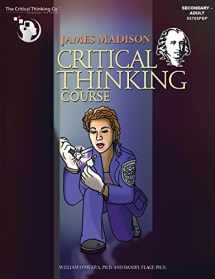
James Madison Critical Thinking Course: Student Workbook - Captivating Crime-Related Scenarios (Grades 8-12)
Book details
Summary
Description
This comprehensive 544-page critical thinking course engages students in captivating crime-solving related scenarios to develop essential critical thinking skills. The step-by-step lessons and activities are easy-to-use and help students transfer these vital skills throughout academia and life. The course can be used with sharp students beginning in 8th grade, above average high school students, and adults.
The course teaches more than 65 critical thinking related skills and concepts that will improve academic performance across the curriculum:
- Interpret and apply complex texts, instructions, illustrations, etc.
- Recognize and clarify issues, claims, arguments, and explanations
- Distinguish: conclusions, premises (reasons), arguments, explanations, assumptions (stated/unstated), issues, claims (statements), suppositions, unstated conclusions, unstated premises and implications
- Recognize ambiguity and unclearness in claims, arguments, and explanations
- Distinguish necessary and sufficient conditions
- Describe the structure or outline of arguments and explanations: confirmation, disconfirmation
- Evaluate whether an inductive argument is strong or weak
- Evaluate claims and arguments in terms of criteria such as: consistency, relevance, support
- And much more
A separate 80-page Answer Guide, sold separately, is required to use this course and includes teaching suggestions and answers. No previous background in logic is required to teach these activities.


We would LOVE it if you could help us and other readers by reviewing the book
Book review



